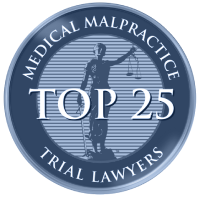Many people assume that modern hospitals and fancy equipment can always fix any health problem. We should feel safe and comfortable under a doctor’s care. But the truth is, even the best doctors can make mistakes that result in serious issues, avoidable injuries, or even patient deaths.
Sometimes, these mistakes are due to avoidable negligence.
It feels far worse when something terrible happens in such a dependent state. We feel let down, disappointed, and maybe even foolish.
Not every legal practice can navigate the intricacies of a medical malpractice case. The highly skilled Lexington medical malpractice lawyers at Crandall & Pera Law have assisted numerous clients who have endured the consequences of medical errors.
If you have experienced medical negligence, we invite you to consult our team. We maintain conveniently located offices in Columbus, Cincinnati, Cleveland, and Lexington.
If you cannot visit our office, we will accommodate you at your location.
Why Choose Our Lexington Medical Malpractice Lawyers?

A skilled lawyer with the right medical malpractice experience can make or break your financial recovery and chance at justice.
Crandall & Pera Law is a reputable legal firm known for its commitment to medical malpractice victims. Our team of attorneys is well-equipped to handle cases in Lexington and surrounding communities.
We’ve earned recognition and accolades for our outstanding work. Learn more about our attorneys on our Attorney Q&A page.
Why We Stand Out: Our medical malpractice attorneys in Lexington are known for their dedication, refusing to settle for anything less than what’s right.
We are the legal team the other guys hate to see coming. Our track record of success emphasizes our commitment to the best outcomes for our clients.
When fighting for your rights and future after a medical malpractice experience, you can trust Crandall & Pera Law to stand beside you.
Another big perk is our in-house registered nurses. They bring valuable medical insights into complicated medical malpractice cases. Understanding the extent of your injuries and what caused them is a critical part of your case.
We use their skills and experience to build your case and work with other medical professionals who can testify.
Insight Into Our Approach: Drawing from our experience as former attorneys in insurance and healthcare defense, we possess valuable insights into the tactics employed by the opposing side.
Leveraging this knowledge, we construct compelling arguments to bolster your claim while pinpointing vulnerabilities in the opposition’s strategy. We meticulously choose respected professionals capable of delivering impartial and professional testimony, including safety and medical scholars.
We are not afraid to take on even the biggest medical institutions in the area, including:
- Cleveland: The Cleveland Clinic Foundation, University Hospitals of Cleveland, Rainbow and Babies Children’s Hospital, Lake Health Hospital, TriPoint Medical Center, Ahuja Medical Center, Southwest General Hospital, and Metro Health Center.
- Toledo: ProMedica, Toledo Medical Center, Toledo Clinic, Mercy Children’s Hospital, and St. Vincent’s Mercy Medical Center.
- Lexington: University of Kentucky Medical Center, UK Good Samaritan Hospital, Baptist Health, Kentucky One Hospital, and Ephraim McDowell Regional Medical Center.
What Is Medical Malpractice?

Medical malpractice is a legal concept where a healthcare professional or medical facility, such as a doctor, nurse, surgeon, hospital, or clinic, fails to provide a standard level of care to a patient, resulting in harm or injury.
This breach of the standard of care can take various forms, including misdiagnosis, surgical errors, medication mistakes, negligent treatment, failure to properly inform a patient of risks, or inadequate follow-up care.
A valid medical malpractice claim requires:
- Duty: The healthcare provider owes a duty of care to the patient.
- Breach of Duty: The provider fails to meet the accepted standard of care, deviating from what a competent medical professional would do under similar circumstances.
- Causation: The breach of duty directly causes harm or injury to the patient.
- Damages: The patient experiences physical, emotional, or financial harm due to negligence.
Medical malpractice cases can require expert testimony and extensive documentation to establish negligence.
Patients who believe they are victims of medical malpractice may pursue legal action to seek compensation for their damages, such as medical expenses, lost wages, pain and suffering, and other related losses.
Medical malpractice laws can vary by jurisdiction, so consult a legal professional experienced in medical malpractice if you believe you have a valid claim.
What Are the Types of Medical Malpractice We Can Help You With?

Medical malpractice can take various forms, and the most common type can vary depending on factors like medical specialties, healthcare facilities, and regional trends.
However, some common types of medical malpractice include:
- Misdiagnosis or Delayed Diagnosis: This occurs when a healthcare provider fails to diagnose a medical condition accurately or takes excessive time to make the correct diagnosis, leading to delayed treatment and potential harm to the patient.
- Surgical Errors: Surgical malpractice can involve mistakes made during surgery, such as operating on the wrong body part, leaving surgical instruments inside the patient, or making other preventable errors during a procedure.
- Medication Errors: These errors can include prescribing the wrong medication, administering incorrect doses, or failing to consider a patient’s allergies or potential drug interactions.
- Birth Injuries: This malpractice can occur during childbirth, leading to injuries to the baby or mother. Examples include injuries due to the misuse of forceps or vacuum extractors during delivery.
- Anesthesia Errors: Anesthesia malpractice may involve administering too much or too little anesthesia, failing to monitor the patient properly during surgery, or not addressing anesthesia-related complications promptly.
- Failure to Obtain Informed Consent: Patients have the right to be fully informed about the risks and benefits of a medical procedure or treatment. If a healthcare provider does not obtain proper informed consent or adequately explain the risks, it can lead to a malpractice claim.
- Negligent Follow-Up Care: Patients may require follow-up care to monitor their recovery after treatment or surgery. Negligence in providing this care can result in complications or harm.
- Nursing Home Abuse and Neglect: In cases of eldercare, negligence or abuse in nursing homes can lead to severe injuries, including bedsores, falls, malnutrition, or physical and emotional abuse.
Medical malpractice cases are highly fact-specific and may involve a combination of these common types of errors.
If you suspect you or a loved one has been a victim of medical malpractice, it’s essential to consult with an experienced attorney to evaluate the specific circumstances of your case.
How Do I Know If I Have a Medical Malpractice Case?

Determining if you have a medical malpractice case typically requires a thorough evaluation by a qualified attorney.
Here are some general steps and factors to consider:
- Establish the Doctor-Patient Relationship: First, confirm your doctor-patient relationship with the healthcare provider in question. You must have been under their care; they owed you a duty of care as your medical provider.
- Identify the Standard of Care: Determine what the standard of care should have been in your situation. The standard of care is the level of care and treatment that a competent healthcare professional of the same specialty would provide under similar circumstances.
- Assess the Breach of Standard of Care: Determine if the healthcare provider deviated from the standard of care. This involves evaluating whether their actions or decisions were negligent or unreasonable compared to what a competent professional would do in a similar situation.
- Establish Causation: To have a valid medical malpractice claim, you must show that the breach of the standard of care directly caused harm or injury. Establishing a clear link between the healthcare provider’s negligence and the harm suffered is essential.
- Document Damages: You must have suffered damages due to the malpractice. This damage includes medical expenses, lost wages, pain and suffering, and other related losses.
- Consult an Attorney: Consult with an experienced medical malpractice attorney who can review your case in detail. They will know how to evaluate the circumstances and determine if you have a valid claim.
- Obtain Expert Opinion: Professional medical opinions are crucial. Your attorney may need to consult with medical experts who can provide testimony supporting your claim, explaining how the healthcare provider’s actions deviated from the standard of care and caused your injuries.
- Statute of Limitations: The statute of limitations for medical malpractice claims in your jurisdiction determines how long you have to file a lawsuit after the malpractice occurred or you discovered it. Failing to meet this deadline can cause the court to dismiss your claim.
Medical malpractice cases are complex and challenging to prove. The legal process can be lengthy and expensive, so it’s crucial to consult with a knowledgeable attorney to assess the strength of your case and determine if pursuing a claim is in your best interest.
Lawyers provide guidance tailored to your circumstances and help you make an informed decision.
How Can a Medical Malpractice Lawyer Help?

A medical malpractice lawyer is a skilled attorney who handles cases related to medical negligence or malpractice. They represent individuals who have been harmed due to substandard medical care or treatment.
Here’s what a medical malpractice lawyer typically does:
- Case Evaluation: The lawyer begins by evaluating the potential medical malpractice case. They review the client’s situation details, including medical records, patient histories, and other relevant documents, to determine if there are grounds for a legal claim.
- Consultation: If the lawyer believes there is a valid case, they will meet with the client to discuss the case’s merits, explain the legal process, and answer any questions or concerns the client may have.
- Gathering Evidence: Medical malpractice attorneys work to gather evidence to support the client’s claim. This may involve obtaining medical records, consulting with medical experts to assess the standard of care, and interviewing witnesses.
- Identifying Damages: The lawyer will assess the damages suffered by the client, including medical expenses, lost wages, pain and suffering, and other related losses. This helps determine the value of the claim.
- Negotiation: Medical malpractice lawyers often negotiate with the opposing party, typically the healthcare provider’s insurance company. They work to reach a fair settlement that compensates the client for damages.
- Filing a Lawsuit: If negotiations do not result in a satisfactory settlement, the lawyer may file a lawsuit on the client’s behalf. This initiates the formal legal process, and the case will proceed through the court system.
- Discovery: During the lawsuit, both sides engage in discovery, which involves exchanging information, documents, and evidence related to the case. This process helps each party prepare their arguments.
- Trial Representation: The lawyer represents the client in court if the case goes to trial. They present evidence, call witnesses, cross-examine the opposing side’s witnesses, and argue the case to the judge and jury.
- Post-Trial Actions: After the trial, the lawyer may assist the client with any post-trial motions, appeals, or negotiations related to the verdict.
- Settlement Negotiation (Post-Trial): Even after a trial, parties may negotiate a settlement before or after a verdict is reached.

Medical malpractice lawyers deeply understand medical standards, legal procedures, and the complexities of medical cases.
They advocate for their client’s rights and work to secure fair compensation for the injuries and damages resulting from medical negligence.
Hiring our Lexington personal injury attorneys significantly betters your chances of obtaining fair compensation for injuries and losses after a medical malpractice experience.
We can handle the legal complexities, allowing you to focus on healing while protecting your rights.
Call us at (859) 800-9090 for your free case evaluation.